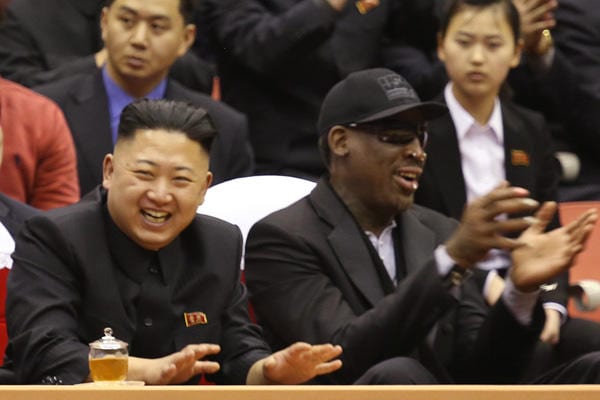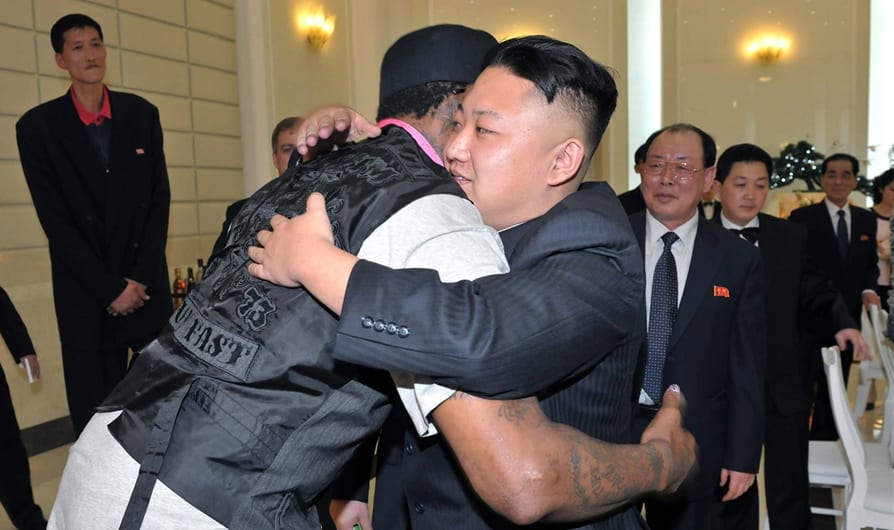by Anna-Lena Tepper
Former NBA player Dennis Rodman’s recent visit to North Korea came to many as a surprise. Along with an entourage of fellow basketball players from the performance group Harlem Globetrotters, Rodman went to visit the most oppressive country in the world, but his intentions weren’t politically motivated. His mission was simply to share the joy of basketball with the North Korean people. In his few days there he did not only initiate several friendly games between American players and North Korean teams, but he also had several friendly encounters with the country’s dictator Kim Jong Un. He left with a great impression of the country and its people and they also seemed to have enjoyed his visit. Upon his return to the States, Rodman’s advice to the President was that he should just call his Communist counterpart to sort things out. This sounds almost too good to be true and very easily done. The question arises, if maybe this approach might yield better results than the ones initiated – or in the case of US-North Korean relationship “non-initiated” – by the international community. After all, Rodman managed to have friendly encounters with one of the US’s biggest enemies.
The field of public or cultural diplomacy has received major academic attention over the last few years. People are not just studying public diplomacy, they also try to analyze, standardize, optimize, generalize, and define it. In an attempt to engage foreign audiences and develop a deeper relationship with them, based on shared interests and common ideas, governments spend millions of dollars each year to implement programs that can facilitate these engagements. However, despite countless highly sophisticated programs – ranging from student and leadership exchanges to a variety of cultural events – that are tailored to different audiences, too often neither scholars, nor policy makers can determine a cause-effect relationship between the programs they implemented and approval rates abroad.
 And then there is Dennis Rodman, who travels to North Korea without a plan and manages to leave the country a few days later and everyone, including the country’s communist leader that hasn’t had any friendly encounters with an American in as long as anyone can remember, is all smiley faces. No science behind it, just what seems like intuition, and it worked – apparently. However, some argue that Rodman’s visit was actually counterproductive, as his approval of Kim Jong Un directly legitimized his questionable leadership.
And then there is Dennis Rodman, who travels to North Korea without a plan and manages to leave the country a few days later and everyone, including the country’s communist leader that hasn’t had any friendly encounters with an American in as long as anyone can remember, is all smiley faces. No science behind it, just what seems like intuition, and it worked – apparently. However, some argue that Rodman’s visit was actually counterproductive, as his approval of Kim Jong Un directly legitimized his questionable leadership.
Still, the question arises if maybe American scholars are sometimes overanalyzing public diplomacy and therefore, often miss their set goals (or can’t detect it). Many argue that Dennis Rodman’s visit was just staged and now that he has gone nothing has changed. Those people have a point. Kim Jong Un has just threatened the United States with a nuclear war again. Politically, Rodman’s visit hasn’t changed anything. However, he still managed to open North Korea to an American visitor for a friendly encounter with the leader for first time in decades, and that is something neither politicians nor scholars have been able to achieve.
Fact is, public diplomacy needs to be very targeted in order to be successful, but at the same time, PD scholars and practitioners should also keep in mind that sometimes intuition is a good indicator of what is a good approach and what is not. Especially in the case of North Korea, maybe a mix of intuitive steps and targeted PD programs is going to lead to a change in the near, or not so near future.
Anna-Lena Tepper is a graduate student at the George Washington University, and is posting as part of Take Five’s ongoing Student Perspective series.



Interesting piece. I like your remark about intuition. “sometimes intuition is a good indicator of what is a good approach and what is not”